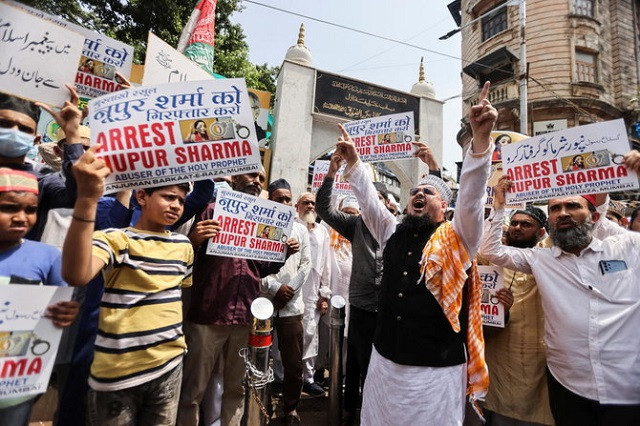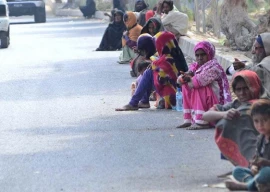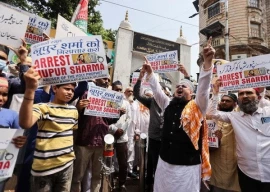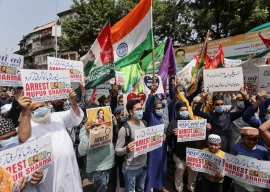
For a long time, India’s human rights abuses in Kashmir and persecution of Muslims seemed to raise no eyebrow among its Gulf allies.
But it is now caught off-guard as volley after volley of condemnations from Arab nations thrust India’s diplomacy into the throes of a tortured process of introspection and an unusual tightrope it had not walked before.
The ruling BJP suspended two of its key politicians and issued clarifications to tamp down the damage as more Muslim nations joined the chorus. This is a novelty.
In March 2019, when then foreign minister Shah Mehmood Qureshi threatened to boycott the Organisation of Islamic Cooperation (OIC) if the invitation was extended to the Indian external affairs minister Sushma Swaraj to be guest of honour at its inaugural session was not withdrawn, UAE pressed ahead with its invitation.
It eventually forced Pakistan to boycott the foreign ministers’ conclave – a rare instance when Islamabad stayed away from the key huddle of the 57-member Islamic body.
In August 2019, just days after India revoked the special status of the disputed Jammu and Kashmir region, Prime Minister Narendra Modi was honoured with the 'Order of Zayed', the UAE's highest civilian award. Later that month, Bahrain, a key ally of Saudi Arabia and UAE, also honoured Modi with “The King Hamad Order of the Renaissance” award.
The diplomatic tenderness continued to grow in the backdrop of strong – but muffled – protests from Pakistan which fell on deaf ears.
In August 2020, Pakistan was so frustrated with the Arab world’s apathy towards Kashmiris that the then foreign minister Qureshi threatened to convene the OIC meeting without Saudi Arabia and UAE. But even the unprecedented reprimand failed to ruffle the feathers of the Arab nations.
Read Imran seeks strong action against Modi's India over ‘hateful’ remarks
In fact, Pakistani officials in private interactions admitted that these Arab countries would never criticize India for its human rights abuses in Kashmir and its overall discriminatory policies towards Muslims since their economic interests were so intertwined with New Delhi.
India safeguarding economic interests
But the recent derogatory remarks by two Indian ruling party members against Prophet Muhammad (peace be upon him) have threatened to unravel India’s bonhomie with the Gulf countries.
Major trading and economic partners of India in the Gulf including Qatar, Kuwait, Saudi Arabia, UAE, Bahrain and Oman have all denounced the insulting remarks and called for action against those BJP members.
Irate over the derogatory remarks, these countries summoned the Indian envoys in a rare move with Qatar going a few steps ahead and demanding a formal apology.
The Modi government was clearly surprised by the swift and angry reaction from these Muslim countries with which India otherwise has an excellent relationship.
The hard-line Modi government, which otherwise has ignored domestic voices against a systematic communal hatred, had to issue a statement and suspended one party member and sacked the other calling them "fringe’ elements".
Analysts believe that the reason the Modi government was now making efforts to control and tamp down the damage is that the deteriorating ties with the Gulf countries could deeply hurt Indian economic interests.
There are about 9 million Indians currently working in Gulf countries who send billions of dollars in remittances back home. India is also dependent on these Gulf countries for oil and other energy products.
“Anti-Muslim comments by two Indian ruling party leaders have caused a major backlash in the Gulf, a top source of Indian oil and gas import and home to one of the largest Indian diasporas with large remittance flows. New Delhi will need to carry out some urgent damage control,” remarked Michael Kugelman, an expert on South Asia.
'US sees diplomatic win'
Analysts believe that the current strain in ties between India and the Gulf countries may be used by the United States to put further pressure on New Delhi.
The Biden administration is not happy with Indian policy on the Russia-Ukraine conflict. Despite strong opposition by Washington, New Delhi continues to import oil from Russia. Many in the US are asking questions if India is a reliable partner.
The Biden administration officials in recent weeks have been more vocal in talking about issues of religious freedom in India.
Washington’s annual report on religious freedom around the world contained a rare – if indirect – criticism of New Delhi, its emerging ally, documenting incendiary comments by Indian public officials and accounts of discrimination against Muslims and Christians in India.
US Secretary of State Antony Blinked said the report showed religious freedom and the rights of religious minorities were under threat around the world.
“For example, in India, the world’s largest democracy and home to a great diversity of faiths, we’ve seen rising attacks on people and places of worship,” Blinken said.
With the latest row over derogatory remarks, Indian could face testing times.
Pakistan, meanwhile, sensing the opportunity has launched a diplomatic offensive to underline its longstanding concerns as to why India under Modi has become a dangerous place for minorities particularly Muslims.
A day after briefing the permanent member of the UN Security Council, Foreign Secretary Sohail Mahmood on Tuesday met the OIC Ambassadors in Islamabad and briefed them on the developments regarding the highly derogatory remarks by two senior officials of India’s ruling party BJP, towards Holy Prophet Muhammad (peace be upon him).
The foreign secretary noted the statement issued by the General Secretariat of the OIC on 5 June, which strongly condemned and denounced the offensive remarks, echoing the sentiment expressed by the OIC member states.
He highlighted the OIC’s role in promoting the rights and fundamental freedoms of the Muslim Ummah around the world. The foreign secretary added that the strong reaction from the OIC countries to such totally unacceptable actions was natural, given the Muslims’ love and reverence for the Holy Prophet (PBUH).
The foreign secretary underlined the importance for the international community to take cognizance of the rising tide of Islamophobia in India. He added that India must be held accountable for stifling the rights of its religious minorities, especially the Muslim population, which is the victim of hate speech, persecution and violence perpetrated under state patronage.
The foreign secretary also underscored the special role of the OIC in this regard.
Observers believe that despite unprecedented anger shown by the Gulf countries, the two sides may not take things to a point of no return.
“India values its ties with key partners in the Muslim world but these partners especially in the Gulf also value their ties with India. This means there are limits to how far they will go in retaliating for the recent anti-Muslim comments. They won’t want to imperil their ties with India,” Kugelman pointed out.



1729662874-0/One-Direction-(1)1729662874-0-165x106.webp)
















COMMENTS (9)
Comments are moderated and generally will be posted if they are on-topic and not abusive.
For more information, please see our Comments FAQ